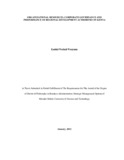PERFORMANCE OF REGIONAL DEVELOPMENT AUTHORITIES IN KENYA
Abstract
government development strategic plan, the Kenya Vision 2030. The RDAs have a big
potential in attracting investments to achieve sustainability and complement the
government’s efforts in wealth and employment creation. However, a number of
management challenges inhibiting RDAs from achieving its objectives. For instance, a
protracted and winding plan preparation process brought about by limited planning skills,
capacity and financial resources have affected effective plans formulation and
implementation. The process has also operated without linkages to key planning institutions
and without effective implementation frameworks. This has resulted to over dependency on
the exchequer for their recurrent and capital requirements, dilution of the mandate of RDAs
and diversion of funds to other institutions for activities meant to be implemented by RDAs;
weak institutional support, poor governance, lack of autonomy, unclear policies on
ownership of assets and absence of regional development policy. Therefore, the purpose of
this study was to determine the influence of corporate governance on the relationship
between organizational resources and performance of regional development authorities in
Kenya. The specific objectives were to establish the influence of technological resources on
performance, determine the influence of financial resources on the performance, establish the
influence of human resources on the performance and establish the moderating effect of
corporate governance on the relationship between organizational resources and performance
of regional development authorities in Kenya. The study was guided by resource based
theory, dynamic capabilities theory, stewardship theory and contingency theory. The study
adopted explanatory research design. The study was conducted in six regional development
authorities that cover 47 counties. This includes Kerio Valley Development Authority,
Ewaso Ngiro South, Ewaso Ngiro North, Coast Development Authority, Lake Basin
Development Authority, Tana and Athi Rivers Development Authority. The targeted
population was 169 comprising of chief managers, managers, heads of department and chief
accountant. The study used stratified random sampling to select 118. Primary data was
collected using structured questionnaires and interview schedules. Pilot study was conducted
to test validity and reliability of research instruments. The researcher used descriptive
statistics and inferential statistics. The findings revealed that organizational resources
significantly accounted for 42.3% variation in performance of regional development
authorities in Kenya (R2=0.423, P=0.000). Specifically, when technological resources
changes by a unit, performance changes by 0.375 units (β1=0.375, P=0.000); when financial
resources changes by a unit, performance changes by 0.236 units (β2=0.236, P=0.011); when
human resources changes by a unit, performance changes by 0.418 units (β1=0.418,
P=0.000). Corporate governance has significant moderating influence on the relationship
between organizational resources and performance as indicated by change in R2=0.109,
p=0.000 implying that the interaction of organizational resources and corporate governance
explained up to 10.9% change in performance of regional development authority. The study
concluded that organizational resources influence performance. The study further concluded
that corporate governance significantly increases the influence of organizational resource on
performance of regional development authorities. The study recommended that regional
development authorities ought to reduce overdependence on exchequer to resources but
generate their own financial resources and link with other organizations for transfer as well
as upscale for technological and human resources. The study also recommended that board
should be diverse in terms of gender, relevant industry experience and independent board
member from the management.

